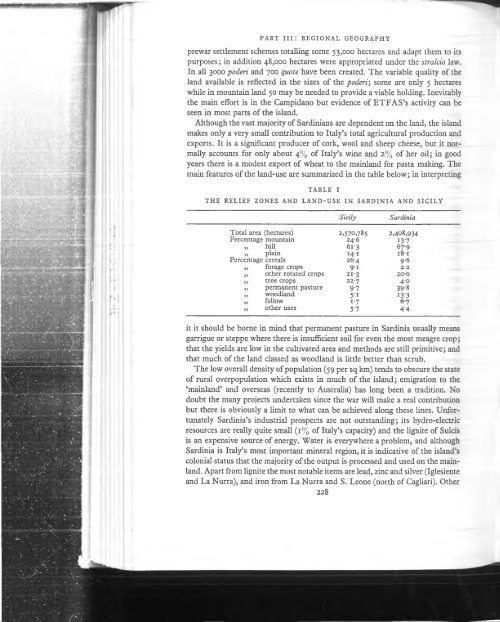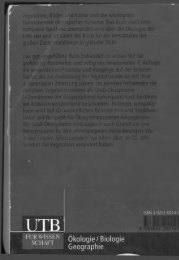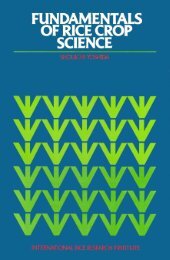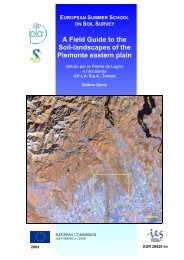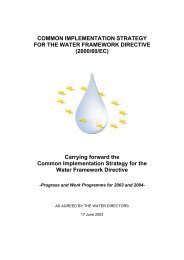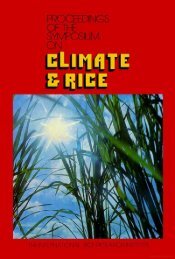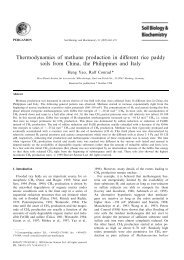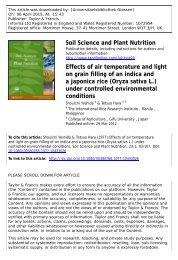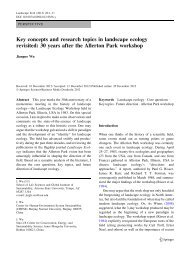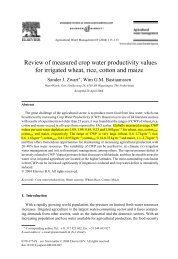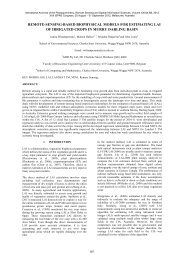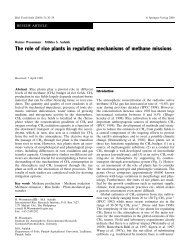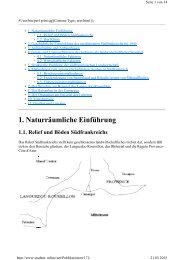Walker - 1967 - A geography of Italy
Walker - 1967 - A geography of Italy
Walker - 1967 - A geography of Italy
You also want an ePaper? Increase the reach of your titles
YUMPU automatically turns print PDFs into web optimized ePapers that Google loves.
AGRICULTURE<br />
{non-appoderata) commonly practised in the South. In this case the tenant works<br />
an odd plot o f land rather than a viable podere; no house is provided and the<br />
contract is for one year only. The landowner is <strong>of</strong>ten a townsman with httle<br />
interest in the land or the tenant apart from the pr<strong>of</strong>its they provide. In much o f<br />
the Mezzogiomo the peasant frequently has a triple rôle; he may be a proprietor<br />
but o f so little land that he is obliged to rent parcels on a mezzadria basis and<br />
perhaps work elsewhere as a labourer.<br />
Over one-third o f <strong>Italy</strong>’s agricultural and forest land is held in properties<br />
(aziende) o f over 50 hectares, but to be concerned with mere size can be misleading;<br />
obviously 50 hectares in Milan province will yield a very different income<br />
from the same area in the mountain provinces <strong>of</strong> Aquila, Potenza or Nuoro. Even<br />
among those units with a high proportion o f arable land there is a wide variety o f<br />
farm types. One group engaged in producing cereals, fodder crops, fruit and<br />
animal products on an intensive capitahstic basis is most t5q>ically represented in<br />
the lower Northern Plain, especially in the provinces o f Vercelli, Milan, Pavia,<br />
Piacenza, Cremona, Brescia and Mantua. A small permanent staff is supplemented<br />
by labourers whose earnings now approach those o f their coimterparts<br />
in industry; they are usually accommodated on the farm and their contracts are<br />
on a yearly basis. The standards achieved are high and the capital invested in<br />
building and equipment is comparable with farms in the United Kingdom.<br />
Mechanization has been encouraged by the relaxation o f restrictions whereby<br />
the operator is obhged to employ labour according to the acreage and land-use.<br />
Processing and marketing, <strong>of</strong>ten on a co-operative basis, are also better organized<br />
here than elsewhere in <strong>Italy</strong>. It is significant that despite the vulnerable size o f<br />
many o f the units concerned, there has been no intervention by the land reform<br />
authorities. Although they are somewhat exceptional, eflScient capitalist farms<br />
are also to be found on the Tyrrhenian lowlands o f Tuscany, Lazio and Campania.<br />
In the low-lying zones o f Emilia and Veneto which have been reclaimed over<br />
the last century a rather different type o f large unit may be identified. Usually in<br />
excess o f 200 hectares and <strong>of</strong>ten run as a company, it is really an estate concentrating<br />
on the production o f cereals, sugar beet, hemp, vines and fruit. It may be<br />
worked entirely with hired laboiur and machinery but it is common practice for<br />
part o f the property to be entrusted to sharecroppers (compartecipanti) who are<br />
responsible, under the supervision o f the operator, for a few hectares each for a<br />
season or a year; no homestead is available on the holding. With experience the<br />
sharecropper may be promoted to the status and responsibihties o f a share<br />
tenant. It is one o f the misfortunes o f these bonifica zones that the demand for<br />
labour during the reclamation phase could not later be sustained, especially with<br />
the progress o f mechanization. In consequence these areas have a long tradition<br />
<strong>of</strong> social unrest which has inevitably invited the attention o f the land reform<br />
authorities (p. 143). The Ente Delta has also provided useful work by continuing<br />
reclamation and the lot o f the hired labourer has been improved by legislation,<br />
243


